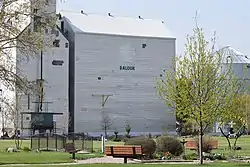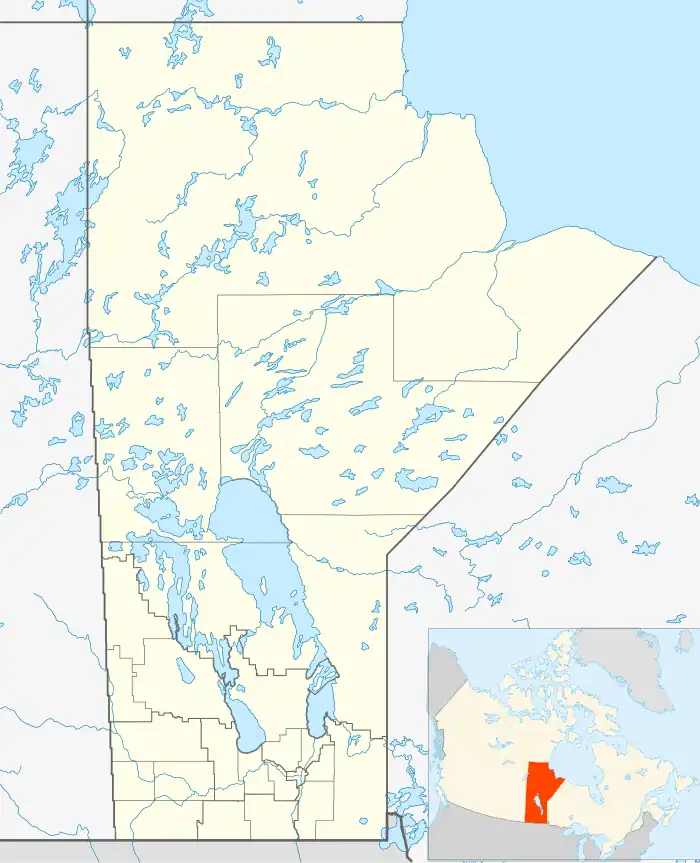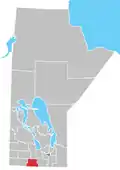Baldur | |
|---|---|
 The grain elevator and Veteran Park in Baldur. | |
 Baldur | |
| Coordinates: 49°23′08″N 99°14′37″W / 49.38556°N 99.24361°W | |
| Country | Canada |
| Province | Manitoba |
| Area | |
| • Total | 2.21 km2 (0.85 sq mi) |
| Population (2016)[1] | |
| • Total | 320 |
| • Density | 144.9/km2 (375/sq mi) |
| Time zone | UTC−5 (CST) |
| • Summer (DST) | UTC−6 (CDT) |
Baldur is an unincorporated community recognized as a local urban district in the Canadian province of Manitoba, located in the Rural Municipality of Argyle.[2] Baldur is the largest community of the municipality, which is in southwestern Manitoba between Brandon and Portage la Prairie. The community is named after the Norse god Baldur.[3]
History
The community was founded in 1890 with the coming of the railway. Its name reflects the Icelandic heritage of the people in the community.
Demographics
In the 2021 Census of Population conducted by Statistics Canada, Baldur had a population of 297 living in 146 of its 155 total private dwellings, a change of -7.2% from its 2016 population of 320. With a land area of 2.14 km2 (0.83 sq mi), it had a population density of 138.8/km2 (359.5/sq mi) in 2021.[4]
Notable people
- It is the birthplace of Hockey Hall of Famer Tom Johnson
- It is the birthplace of award-winning author and naturalist Bill Stilwell
- It was where the Icelandic businessman Hallgrímur Fr. Hallgrímsson (1905–84) went to high school.
Climate
| Climate data for Baldur | |||||||||||||
|---|---|---|---|---|---|---|---|---|---|---|---|---|---|
| Month | Jan | Feb | Mar | Apr | May | Jun | Jul | Aug | Sep | Oct | Nov | Dec | Year |
| Record high °C (°F) | 8.9 (48.0) |
13.5 (56.3) |
21.7 (71.1) |
36 (97) |
37 (99) |
37.2 (99.0) |
37.8 (100.0) |
39.5 (103.1) |
38.3 (100.9) |
34 (93) |
24.5 (76.1) |
15.6 (60.1) |
39.5 (103.1) |
| Mean daily maximum °C (°F) | −10.7 (12.7) |
−6.9 (19.6) |
−0.4 (31.3) |
10.4 (50.7) |
19 (66) |
23.1 (73.6) |
25.6 (78.1) |
25.4 (77.7) |
18.8 (65.8) |
11.4 (52.5) |
0 (32) |
−8.2 (17.2) |
9 (48) |
| Daily mean °C (°F) | −16.4 (2.5) |
−12.7 (9.1) |
−5.9 (21.4) |
3.6 (38.5) |
11.6 (52.9) |
16.4 (61.5) |
18.8 (65.8) |
18 (64) |
11.9 (53.4) |
4.9 (40.8) |
−4.9 (23.2) |
−13.5 (7.7) |
2.6 (36.7) |
| Mean daily minimum °C (°F) | −22.1 (−7.8) |
−18.5 (−1.3) |
−11.4 (11.5) |
−3.1 (26.4) |
4.2 (39.6) |
9.6 (49.3) |
12 (54) |
10.5 (50.9) |
4.9 (40.8) |
−1.5 (29.3) |
−9.8 (14.4) |
−18.8 (−1.8) |
−3.7 (25.3) |
| Record low °C (°F) | −41.1 (−42.0) |
−42.5 (−44.5) |
−36 (−33) |
−29.4 (−20.9) |
−10.6 (12.9) |
−2.8 (27.0) |
1.1 (34.0) |
−4 (25) |
−7.8 (18.0) |
−22.5 (−8.5) |
−35.5 (−31.9) |
−39 (−38) |
−42.5 (−44.5) |
| Average precipitation mm (inches) | 22.9 (0.90) |
23.4 (0.92) |
26.4 (1.04) |
32.2 (1.27) |
62.6 (2.46) |
91.7 (3.61) |
69.2 (2.72) |
73.8 (2.91) |
49.8 (1.96) |
39.3 (1.55) |
26.8 (1.06) |
25.4 (1.00) |
542.5 (21.36) |
| Source: Environment Canada[5] | |||||||||||||
See also
References
- ↑ "Census Profile". 2016 Census. Statistics Canada. February 8, 2017.
- ↑ "Local Urban Districts Regulation". Government of Manitoba. April 23, 2016. Retrieved April 24, 2016.
- ↑ "Town of Baldur website". Retrieved January 11, 2019.
- ↑ "Population and dwelling counts: Canada and designated places". Statistics Canada. February 9, 2022. Retrieved September 3, 2022.
- ↑ Environment Canada - Canadian Climate Normals 1971-2000—Canadian Climate Normals 1971–2000, accessed 08 March 2011
External links
